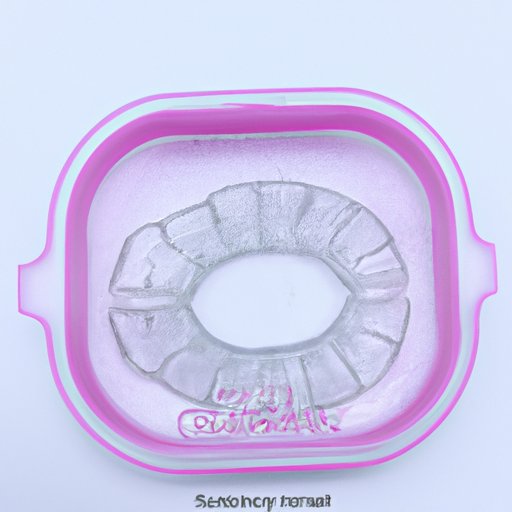
Introduction to the Importance of Cleaning Retainers
Retainers are orthodontic devices that help keep teeth in their new position after braces have been removed. They are made of plastic or acrylic and are custom-fit to the individual’s mouth. Retainers can be expensive, so it’s important to keep them clean to ensure their longevity. Regular cleaning helps prevent harmful bacteria from growing and causing unpleasant smells or infections. In this article, we’ll provide a step-by-step guide to cleaning your retainer, discuss home remedies and cleaning products, as well as provide dos and don’ts of retainer care.
Step-by-Step Guide for Cleaning Retainers
Before beginning the cleaning process, gather the necessary equipment: mild dish soap, toothbrush (preferably soft-bristled), a clean towel, and cold water.
Step 1: Rinse your retainer under cold water immediately after removing it from your mouth. This removes some of the bacteria and debris that may have accumulated during the period it was in your mouth.
Step 2: Mix a small amount of dish soap with cold water and pour it into a container. Avoid using hot water, as it can warp the plastic. Use a toothbrush (preferably soft-bristled) to gently brush the retainer. Make sure to clean all areas, including the crevices and visible buildup.
Step 3: Rinse the retainer with cold water thoroughly after brushing it. Use your fingers to ensure all soap has been removed. Rinse multiple times to ensure all soap has been washed away.
Step 4: Dry the retainer with a towel after rinsing to prevent any water spots or sediment from drying and being trapped in the retainer.
Step 5: Ensure to store the retainer in the case provided to prevent damage or bacteria accumulation.
Home Remedies for Cleaning Retainers
While dish soap and cold water make an effective and straightforward cleaning solution for your retainers, other home remedies could be used as well. Below are a few natural and straightforward methods that will help keep your retainers clean and fresh.
Baking Soda: Mix a ½ tsp of baking soda with a cup of water, put your retainer in the solution and set it aside for 15 minutes. Rinse thoroughly with cold water afterward.
Vinegar: Mix a ½ cup of water with a ½ cup of white vinegar. Soak your retainer in the solution for 15 minutes. Rinse thoroughly with cold water afterward.
Mouthwash: Soak your retainer in mouthwash for about half an hour and rinse well afterwards.
Retainer Cleaners
If you prefer to purchase commercial cleaning products, there are various retainer cleaners available, including foams, sprays, and wipes.
Foams: Retainer cleaning foams contain active cleaning agents and often eliminate germs and bacteria. They are easy to use, and some foams come with cases designed specifically for retainers that hold the foam and the retainer together.
Sprays: Retainer cleaning sprays are similar to foam and are effective at cleaning and protecting retainers. They are often applied directly to the retainer and do not require rinsing.
Wipes: Retainer cleaning wipes offer the convenience of quick cleaning. They are easy to use and often come in small individual packets, making them ideal for travel.
It is important to note that overuse of cleaning products can cause damage to your retainer. Use retainer cleaning products as directed and in moderation.
Dentist-Recommended Products for Cleaning Retainers
Your dentist or orthodontist can recommend products specifically designed for cleaning retainers that are safe and effective. Examples include cleaning tablets, enzymatic cleaners, and polishing cloths.
Cleaning Tablets: Cleaning tablets are formulated specifically for retainers and orthodontic appliances. Drop one tablet into a cup of water and soak your retainer for the recommended amount of time. Rinse thoroughly afterward.
Enzyme Cleaners: Enzyme cleaners use natural enzymes to break down bacteria and plaque. Soak your retainer in the solution as directed and rinse with cold water afterward.
Polishing Cloths: Polishing cloths are designed to gently and effectively clean your retainer without causing damage. Use the cloth as directed and avoid applying too much pressure, which could harm or damage your retainer.
Dos and Don’ts of Cleaning Retainers
When caring for your retainer, it’s important to follow proper cleaning techniques to prevent damage or deterioration. There are also some things you should avoid when cleaning your retainer. Below are some dos and don’ts to keep in mind when cleaning retainers:
Dos:
- Do brush your retainer regularly with mild dish soap and cold water.
- Do store your retainer in its case when not in use.
- Do soak your retainer in warm water every once in a while to remove any mineral deposits that may build up over time.
- Do visit your dentist or orthodontist regularly, and get your retainer checked during your routine examination.
Don’ts:
- Don’t use hot water when cleaning your retainer, as it could damage the plastic or acrylic materials.
- Don’t use toothpaste or abrasive cleaners; they can harm the retainer and cause visible scratches or lead to breakages.
- Don’t expose your retainer to direct sunlight or heat, as it may warp or lose its shape.
- Don’t forget to clean your retainer after eating or drinking anything except cold water.
Conclusion
Retainers are vital oral appliances after orthodontic treatments and must be cared for regularly. Regular cleaning helps to prevent bacteria from accumulating and causing harm to the teeth and gums, as well as ensure that your retainer remains functional for a long time to come. This article has provided a guide with steps on how to clean your retainer, including home remedies and products recommended by dentists. Keep your retainer clean and continue to enjoy a healthy and confident smile.
If you need more information or have any questions regarding the care and maintenance of your retainer, don’t hesitate to contact your dentist or orthodontist for assistance and advice.




